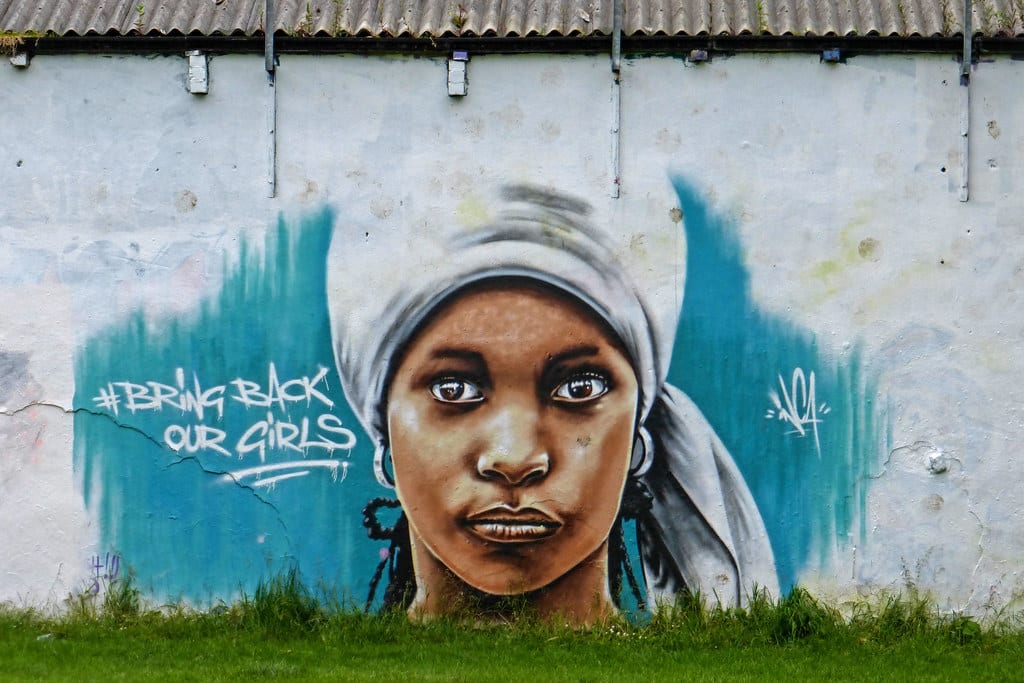Photo: #BringBackOurGirls mural in West Vale, UK - Flickr
Nigeria is engulfed by a wave of kidnappings carried out by various armed groups that are tightening their grip on Nigerian society. The glaring problem of mass kidnappings came into the spotlight after Boko Haram abducted 276 schoolgirls from Chibok in 2014, an act that caused worldwide consternation. But even today, kidnappings continue to hit Nigeria. This year for instance, on the 7th of March, 287 innocent schoolchildren became victims of a kidnapping in northwestern Nigeria, just days after more than 200 women and children were abducted in the northeast.
Abductions are frequently used by various parties in conflict situations across the country, with the aim of attracting attention and achieving their demands and objectives. We asked Dengiyefa Angalapu, researcher of the Nigerian Centre for Democracy and Development, about the root causes and possible solutions of this kidnapping crisis.
Deep-seated causes
Angalapu stressed that the problem of kidnappings in Nigeria "is bigger than people think" and that "it has now become an entire industry". In 2023, the country experienced a peak of 2118 abductions, a disturbing fact. Angalapu argues that Nigeria's economic crisis is at the heart of the problem, with high unemployment, poverty and inflation creating an environment in which armed groups thrive. In an environment where people struggle to survive and meet their basic needs, they become more susceptible to the recruitment efforts of these groups, which offer promises of financial support and social stability in exchange for their participation in criminal activities. The country's economic situation is also used to justify the extreme actions of these groups.
"Abductions have now become an entire industry"
But Angalapu argues that there are more factors contributing to the kidnapping crisis. For instance, ideological motivations also play an important role, with Islamist terrorist groups such as Boko Haram and ISWAP (West Africa Province of the Islamic State) using abductions as a bargaining chip to advance their agenda. In addition, secessionist groups such as the Indigenous People of Biafra (IPOB), Eastern Security Network and Autopilot have a desire to separate from Nigeria and establish an independent state called Biafra. They have resorted to kidnappings to draw attention to their problems and aspirations.
So kidnappings are often used to draw attention to problems in the country. Angalapu also cites the example of kidnappings of employees of oil multinationals in the Niger Delta. "It is a bargaining chip to draw the government's attention to environmental pollution and devastating conditions in the Niger Delta," Angalapu argues. Decades of activities by oil companies, including Shell, in the Niger Delta came at the expense of human rights in the region. Frequent oil spills and inadequate maintenance and cleaning of infrastructure have polluted groundwater and drinking water sources, poisoned farmland and fisheries, and severely affected the health of residents.
"It is a bargaining chip to draw the government's attention to environmental degradation and devastating conditions in the Niger Delta."
Political unrest adds another layer of complexity. Angalapu says abductions often coincide with elections, where political opponents or potential voters are targeted to influence the outcome or destabilise the democratic process.
Angalapu cites another reason for abductions: "It is a recruitment strategy, sometimes terrorist organisations force the people they have abducted to join them." Sometimes these abductees are used as active fighters as well as secret agents.
"Sometimes terrorist organisations force the people they have kidnapped to join them"
Immediate action and long-term solutions
To combat the immediate problems, Angalapu says a multi-pronged approach is needed. In doing so, he surprisingly starts talking about the motorbike, the most common means of transport for kidnappings: "To tackle the frequent kidnappings by motorbikes, it is necessary to set up better marking systems that effectively link these vehicles to their owners, enabling a quick tracing in case of criminal activities. In addition, introducing restrictions on large-scale fuel sales can help control the misuse of motorbikes for illegal purposes," he explained.
"To deal with the frequent kidnappings by motorbikes, it is necessary to set up better market systems that effectively link these vehicles to their owners, allowing them to be traced quickly in case of criminal activities."
Communication security also plays a crucial role in countering abductions. Angalapu states, "To promote detection, it is necessary to invest in improving security protocols around communication systems." He also stresses the importance of addressing security risks associated with the use of cash. Because the cash economy leaves few digital traces, criminals can operate undetected more easily. Supporting the digitilisation of banks and promoting digital transactions would increase the transparency and traceability of financial transactions.
Moreover, the justice system, especially the police, needs urgent reform and decentralisation. "Police services should be accessible nationwide so that coverage is ensured across the country. This is not the case now," Angalapu explained. Court cases need to be faster to avoid the long delays that are all too common now. There is also a need to involve traditional authorities, such as religious leaders, in the process.
"Police services should be accessible nationwide so that coverage is assured across the country. This is not the case now"
A powerful counter-offensive
If we want to address the underlying structural problems, we need to focus not only on immediate security issues and criminal activities, but also on poverty and unemployment. It is crucial that Nigeria addresses its long-standing structural problems. International cooperation can provide a powerful counter-offensive in this regard by strengthening the rule of law, promoting economic development and supporting local organisations.
Local organisations play a key role in addressing community challenges and strengthening social resilience against extremist ideologies and criminal influences. A striking example is the "Bring Back Our Girls" campaign, which not only created awareness about the persecution of women in Nigeria, but also contributed to the facilitation of asylum applications for those fleeing persecution. Moreover, there was a silent effort in collaboration with this movement to train 11 released Chibok girls who previously could barely read and write.
"To combat the immediate problems, a multi-pronged approach is needed"
Despite efforts, many abductees still remain missing. Of the 276 Chibok girls abducted in 2014, 112 still remain unaccounted for. As is often the case with large-scale problems, there is no easy solution. The deep-rooted social causes require several approaches. Initiatives such as the Nigerian Centre for Democracy and Development and Save the Children in Nigeria contribute to long-term solutions. At the same time, it is essential that the Nigerian government, in collaboration with local civil society organisations and with the support of national and international actors, does all it can to prevent abductions. This requires both structural measures and direct action to ensure the safety of citizens.




